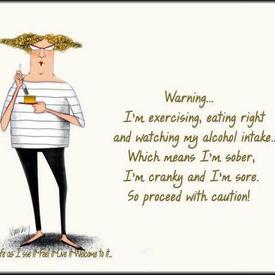sodium vs. potassium

Warren_Carrol
Posts: 21 Member
I'm sure it's been covered here before, but I just wanted to share my "breakthrough"
my wife is Nurse in a cardiac functions clinic and therefore deals with people having congestive heart failure...one of the things that is a big warning sign is a large weight gain over a short period of time (5lbs over 1 or 2 days)
This is almost always caused by a high sodium diet and the body not being able to process it.
The key to help counteract sodium retention is....Potassium.
More or less (bear with me, I'm just a car guy trying to understand nurse stuff) sodium is a moisture sponge in your body and potassium is what wrings out that sponge.
The day I started to understand the relationship, I started to more consistantly lose weight (and understand why when I ate a crappy pizza, it took me a week to shake off the sodium)
needless to say, I now try to maintain as close to 1:1 ratio of sodium to potassium intake....it's not simple as sodium is much easier to come by in massive quantities, but with some research and practice, it's for sure possible.
happy fitnessing.
p.s. bananas aren't the sole source of potassium.....google that ****.
my wife is Nurse in a cardiac functions clinic and therefore deals with people having congestive heart failure...one of the things that is a big warning sign is a large weight gain over a short period of time (5lbs over 1 or 2 days)
This is almost always caused by a high sodium diet and the body not being able to process it.
The key to help counteract sodium retention is....Potassium.
More or less (bear with me, I'm just a car guy trying to understand nurse stuff) sodium is a moisture sponge in your body and potassium is what wrings out that sponge.
The day I started to understand the relationship, I started to more consistantly lose weight (and understand why when I ate a crappy pizza, it took me a week to shake off the sodium)
needless to say, I now try to maintain as close to 1:1 ratio of sodium to potassium intake....it's not simple as sodium is much easier to come by in massive quantities, but with some research and practice, it's for sure possible.
happy fitnessing.
p.s. bananas aren't the sole source of potassium.....google that ****.
0
Replies
-
Interesting post. I'll do some research on this. If I come up with the same info that you've provided I'll try it out and pass it on to my mother-in-law who has a hard time with high sodium/ high blood pressure/ etc.0
-
Yes, really interesting..I would like to have a better understanding of this topic.. sodium was one of the biggest shockers to me when I joined the site..looking back I think there were several days times during my teens and college.. i probably ate 4 or 5 times the reccomended limit!! I'm trying my best to stay away from boxed and canned food and now I usually stay under my limit. so many people really don't look at sodium levels...but I'm trying to make an effort..we have a family member who I believe is in the first stages of heart failure..her feet are constantly swollen to abnormal sizes and her diet is, of course, high in sodium........0
-
I'm trying to track down the medical report she sent me regarding it...when I find it I'll post it up.0
-
I HAVE HEARD THIS BEFORE!
I heard this a few years ago and asked several doctors about it but they all shook their head and looked at me as if my eyebrows were on fire.
I still think there must be some truth to this because it keeps coming up from time to time.0 -
Keeping my sodium/potassium ratio close to 1 helps A LOT with weight fluctuations and water retention. I learned all about this when my grandfather was in the Cardiac ICU for a month for congestive heart failure over the holidays last year.
Red potatoes are VERY rich in potassium as are black beans, bananas, spinach, and starchy veggies (peas, yucca, etc.). Morton also makes a light table salt that is close to 1:1 sodium:potassium ratio.
Tip for MFP: look for items without an asterisk beside them in the database. Those items in the database have potassium listed so you can track it better. Obviously, this doesn't work for all food items, but it works well for ensuring you hit your minimum potassium requirements.
Magnesium is also important for electrolyte balance. Most foods rich in potassium are also magnesium rich. Look for dark starchy veggies and fruits.0 -
Thanks for sharing this and actually explaining it so that I can understand it....This helps me quite a bit....I have heard this before but it's never been really explained and I wasn't sure of the ratio amount until now either b/c these are two of the macros that I keep track of...Thanks again!!
 0
0 -
http://health.msn.com/health-topics/osteoporosis/potassium-and-sodium-the-dynamic-duo
a good article that explains it in a way I can understand.0 -
spinach, swiss chard, kale - all very high in potassium. all very good for you!0
-
Very helpful information. Thanks for sharing. A very good, tasty source of potassium is coconut water. Has even more than bananas. Also, potassium helps blood pressure regulation.0
-
I have known for a while that potassium helps with sodium(not really how it works but it helps), but the sponge description was great! I track my sodium and potassium and I try to get more potassium every day. That doesn't always happen, so on those days I'll drink loads of water. Once I started tracking my potassium, (and by looking in friends diaries) I have started to consume a lot of fruit. All fruit (not just bananas, you're totally right on that) have a ton of potassium. Coffee too! One of the many great reasons to start my day off with a cup of potassium.. wait.. I mean coffee.
 0
0 -
Great post! Bump0
-
I've been working on sodium/potassium ratio for several years now. My doctor recommended aiming for twice as much potassium as sodium in my diet - and to get it from FOOD not from supplements. There are quite a few articles online about it but here's one I saved: http://www.umm.edu/altmed/articles/potassium-000320.htm0
-
I found out the other day that I'm low in potassium my legs hurt and I'm feeling tired and toes tingle some was told I'm not having enough sodium either. I'm taking potassium tablets and having a bannana daily and I always eat spinach. How could I have gotten low on potassium? I'm having trouble with cardio did it the other day but today I hurt. Any advise?0
-
I am on 2 hbp meds and I need more potassium, my doctor told me. This explains a lot! My mom brought up coconut water to me. I might look into that. Kales chips are good too.0
-
I found out the other day that I'm low in potassium my legs hurt and I'm feeling tired and toes tingle some was told I'm not having enough sodium either. I'm taking potassium tablets and having a bannana daily and I always eat spinach. How could I have gotten low on potassium? I'm having trouble with cardio did it the other day but today I hurt. Any advise?
Are you tracking your potassium or just assuming you're getting enough? Try to track it for a few days and see if you are still short. If so, try to eat more bananas, red potatoes, black beans, etc.0 -
Just a warning... Potassium can be a real problem in excess quantities. Too much or too little potassium can cause fatal heart arrhythmia. Be careful with Salt Substitutes that replace Sodium with Potassium. Also, don't get an idea to mega dose with Potassium supplements to offset Sodium intake. Keep in mind there are certain medicines that can cause the body to conserve Potassium, such as ACE Inhibitors (a common family of Blood Pressure medicines). If you are taking an ACEI, they come with the instruction to monitor Potassium levels and avoid too much Potassium in the diet. I think if your source for micronutrients is food and not supplements it will be a safer bet. For example, magnesium supplements will give you diarrhea

My bottom line here is that consuming your RDA for Sodium and Potassium (and any other micro or macronutrient), eating your recommended amount of calories and exercising responsibly is all you need to lose weight. Things can get dangerous when you mess around with your electrolytes. Keep it simple...0 -
the best suggestion is talk to your DR. I take both a diretic (laxis) and Potassium 2x a day perscribed by my DR. read my profile and you'll see why its important to consult your Dr. about these sort of questions!0
-
Thanks for the info and the link Warren. I've been decreasing my sodium intake and have been eating more fruits and veggies. I'll have to track it and see if I'm actually getting the daily required intake of potassium. I'm interested to see if it makes a difference in my BP. Interesting link. Thanks again:)0
-
I will thank u so much u see I thought it was shin splints but it continued saw my homeopathic dietician got on tablets and having a banana daily and onega 3 but for I'm calling my dr office and getting in there tomorrow. Again thanks for the good advice
 0
0 -
Great sources of potassium:
avocados, cantaloupe and honeydew melons, tomatoes especially concentrated sauces like marinara, beets and beet greens, sweet potatoes and winter squash, oranges and orange juice, russet potatoes with the skin, mangos and papaya, raisins, dried apricots, halibut, salmon, tuna, old fashioned molasses0 -
Thank u I'm cooking black beans now0
-
thanks for the great information. I never knew!!!0
-
the best suggestion is talk to your DR. I take both a diretic (laxis) and Potassium 2x a day perscribed by my DR. read my profile and you'll see why its important to consult your Dr. about these sort of questions!
Great advice.0 -
Thanks Warren for posting this.0
-
Sodium is essential to your bodily functions. The recommended daily amount is actually good for you. The problem is getting too much sodium usually in sodas and processed foods can cause weight retention and other health issues.
Potassium is both an electrolyte and a mineral. It helps keep the water (the amount of fluid inside and outside the body's cells) and electrolyte balance of the body. Potassium is also important in how nerves and muscles work.
Potassium levels often change with sodium levels. When sodium levels go up, potassium levels go down, and when sodium levels go down, potassium levels go up.
It is much harder to reach the daily recommended potassium level but not impossible. Many foods are rich in potassium, including scallops, potatoes, figs, bananas, prune juice, orange juice, nuts and squash. I recently added potassium as something to track in my food diary.
Hope this helps.0 -
I can verify this. Had CHF a few years ago. (Not from sodium, but from pre-eclampsia.) I was put on a low sodium diet, many meds and 20 meq of potassium twice a day.
But please be careful with the potassium. Overdoing the K can cause an imbalance with your electrolytes and mess up your heartbeats/blood pressure.0 -
I was also told I needed sodium u always hear about not having too much and I know it comes in foods I don't eat too much processed foods just cause I try to watch carbs and my hubby is diabetic. I have green salads and protein etc.0
-
Very interesting, I have never heard this! Thanks!0
-
I was also told I needed sodium u always hear about not having too much and I know it comes in foods I don't eat too much processed foods just cause I try to watch carbs and my hubby is diabetic. I have green salads and protein etc.
________________________________________________________________________________________
Dudagarcia,
It is common to be deficient in sodium on low carbohydrate diets. This, in turn, causes the body to excrete potassium as well. It's called "natriuresis." Volek and Phinney, in their book "The Art and Science of Low Carbohydrate Living" write about this issue. When I find the quote, I'll edit this post so that you can have the benefit of their wisdom.
[Edit]
On pages 149-154 of their book, the authors write in relevant part: "[A]ll carbohydrate-restricted diets, even ones providing 50-60 grams . . . are natriuretic - they make the kidneys dump sodium. Now, if you are bloated, edematous, or hypertensive, 'dumping sodium' is a good thing. But if you do not (or no longer) have these fluid-excess symptoms, then over-excretion of sodium . . . can have negative health effects as well. . . . At some point, . . . the adrenal gland secrete the hormone aldosterone, which makes kidney tubular cells excrete potassium in order to conserve sodium. nless there is copious potassium coming in from the diet, this excess urinary potassium comes from the body's potassium pool inside cells. Two things then happen. First, nerve and muscle cells don't work well, leading to cardiac dysrhythmias and muscle cramps. Second, because potassium is an obligate component of lean tissue, the body starts losing muscle even if there's plenty of protein in the diet."
They recommend taking two bouillon cubes a day in two cups of water to solve the sodium problem.
DBB070 -
I'm absolutely not a doctor (I didn't even stay in a holiday inn express last night)
I wouldn't suggest cramming too much of anything in yourself to offset anything else (such as sodium/potassium)
obviously, if you have a pre-existing health issue, all bets are off and just consult with your doctor.0
This discussion has been closed.
Categories
- All Categories
- 1.4M Health, Wellness and Goals
- 398.1K Introduce Yourself
- 44.7K Getting Started
- 261K Health and Weight Loss
- 176.4K Food and Nutrition
- 47.7K Recipes
- 233K Fitness and Exercise
- 462 Sleep, Mindfulness and Overall Wellness
- 6.5K Goal: Maintaining Weight
- 8.7K Goal: Gaining Weight and Body Building
- 153.5K Motivation and Support
- 8.4K Challenges
- 1.4K Debate Club
- 96.5K Chit-Chat
- 2.6K Fun and Games
- 4.8K MyFitnessPal Information
- 12 News and Announcements
- 21 MyFitnessPal Academy
- 1.5K Feature Suggestions and Ideas
- 3.2K MyFitnessPal Tech Support Questions


















